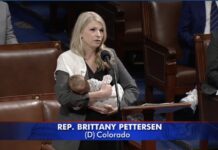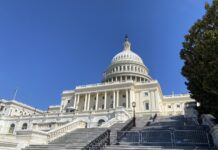
ATLANTA (GA Recorder) — The 2022 election in Georgia officially began Monday as candidates flocked to the state Capitol to put their names on the ballot.
Candidates have until noon Friday to qualify to run, but the first day saw big crowds at the Capitol, where Democrats and Republicans queued up to fill out their paperwork in separate rooms.
When the doors opened at 9 a.m., the GOP line was significantly longer, with conservative firebrand Congresswoman Marjorie Taylor Greene and state House Speaker David Ralston at the front of the pack. The long line saw pairs of candidates preparing to face off against each other in the May 24 primary, including Secretary of State Brad Raffensperger ahead of opponent former Alpharetta Mayor David Belle Isle and physician Charles Lutin, who stood several paces behind Greene, who he is hoping to unseat.

Watching opposing candidates line up together is a little unusual, Ralston said, but he welcomes the fresh blood.
“I think it’s just a sign of the growth of the party when we have multiple candidates running for the same position,” he said. “I can remember a time when we’d have to go out and drag somebody in at the last minute to qualify. We’re growing. We’re quite a family.”
Still, Ralston warned his fellow Republicans not to snooze on the Democrats.
“Every two years, the lease is up, and we have to renew, and that’s up to the voters,” he said. “Georgia is becoming a more competitive state, that is the reality. We have to always be mindful of that.”
According to the secretary of state’s website, 272 Republican candidates qualified on day one, compared with 151 Democrats, though the ratio will likely change as the qualifying period continues.
Parties think it is important to give their supporters someone to vote for in every race, said University of Georgia political science professor Charles Bullock.
“They like to have every position offering an individual, even when that individual has virtually no chance of winning,” he said. “So, they try to get someone in all 56 Senate contests, all 180 House contests. If you leave a lot of those blank, then the talking heads think ‘Well, this shows that the party is not that strong.’ And a Republican running in a heavily Black district in downtown Atlanta doesn’t have any chance of winning, a Democrat running up in a rural area represented by Marjorie Taylor Greene doesn’t have a chance to win, although there are those crazy things that happen, a late breaking scandal, something like this where, occasionally, a person who, if you were putting odds that’d be one in 1,000, they win one in 1,000 times. So that would be another reason, to make sure you at least have a name there in case something crazy were to happen.”
Some state legislative districts are guaranteed to have new representation. Powerful Senate Rules Chair Sen. Jeff Mullis of Chickamauga announced Monday he will not seek re-election after 22 years in the Senate. Two other long-time Republican elected officials, House Budget Committee Chair Terry England of Auburn and Sen. Lindsey Tippins, previously announced their retirement this year.
Labor Commissioner Mark Butler also says he plans to hang it up, and three Democrats signed up to replace him Monday, including House Minority Whip Rep. William Boddie of East Point and Sen. Lester Jackson of Savannah.
Democrats smell success
As the morning went on, the Democrats’ line grew longer, which was a happy sight for Atlanta Democratic Congresswoman Nikema Williams.

“I cannot wait until Friday when you see this very diverse slate of candidates all across the state of Georgia qualifying to run for election as a Democrat in the state of Georgia,” Williams told reporters at the state Capitol Monday. “It’s a new day in Georgia, we proved that in 2020 when most of y’all didn’t believe me when I said we were a battleground state. I think I said it enough that it caught on with our electorate, and we shocked the world, and there’s more to come.”
Georgia was pivotal in the 2020 election, narrowly choosing President Joe Biden over then-President Donald Trump, the first time the state elected a Democrat since the 1990s, and giving Democrats control of Congress with a pair of nail-biting runoffs that elected Sens. Raphael Warnock and Jon Ossoff.
Williams said she is confident her party will continue its momentum, but this year will test how Democrats will fare on the new GOP-drawn maps that passed the state Legislature late last year.
“I heard the judge loud and clear when he didn’t want to interrupt the election calendar,” she said. “I might not have agreed with it, but that’s what the judge ruled, and so we’re running on the maps that we’ve been dealt. It’s unfortunate, we shouldn’t have to organize our way out of gerrymandering and voter suppression, but this is the hand we’ve been dealt, and Georgia Democrats all over the state, we’re not giving up.”
Democrats could make modest gains in the state Legislature, but they are likely to lose one congressional seat, Bullock said.
Republican candidates were also fired up about 2020. Former state Rep. Vernon Jones, who dropped out of the governor’s race to run for Congress in the vacant District 10, boasted of his strong Trump connection.
“President Trump has given me his endorsement,” he said. “As a matter of fact, I’ll be leaving shortly to go meet with Don Jr. The president’s going to be coming here soon, you will see me more on stage with the president, getting more of his support and getting voters to come out and support me for the 10th Congressional District. We’re going to stop that squad in DC, we’re going to take Congress back.”

The former president remains at the center of electoral conspiracy theories, and candidates like Jones seem to be betting he’s still at the center of Georgia Republicans’ hearts. That premise will be tested when Jones and other Trump-blessed candidates get their results back in May, Bullock said.
“The belief is right now that if you get Trump’s blessing as a Republican, you’re golden,” he said. “That goes back, in Georgia, probably to what happened in the runoff for governor four years ago. Trump came out and said that Brian Kemp was his man, Kemp’s popularity went off like a rocket. The question is, is that still the world in which we live? I don’t know. A survey that we did over here at UGA showed 40 some odd percent of likely Republican voters said yeah, it’s important who Trump endorsed, an equal number said it wouldn’t matter one way or the other.”
Kemp has fallen out of favor with Trump for his refusal to illegally overturn Georgia’s election results, and Trump now supports former Sen. David Perdue as Georgia’s next governor, but Perdue is hardly a shoo-in.
“It looks like getting Trump’s endorsement is probably an asset in the Republican primary, but if we see candidates that have Trump’s blessing not winning the nominations, that’s going to be a big message, not just in Georgia, but nationwide, that Trump’s magic is fading.”
The candidates

Neither Kemp nor Perdue qualified on the first day, but plenty of other big names did, including Warnock and both of his major Republican competitors, former University of Georgia football star Herschel Walker and Agriculture Commissioner Gary Black.
“It is the honor of my life to represent the people of Georgia in the United States Senate,” Warnock said. “I’m grateful for the opportunity to qualify again today, and I’m on my way back to D.C, to fight to lower the costs for consumers, especially insulin, which is something I’m focused on right now, trying to lower gas prices and hold corporations accountable. I can’t wait to get back to work.”
Black said he is the best candidate because he has the most experience.
“It’s about solving problems for Georgians, which is something I’ve been doing my entire life, it’s about standing up for Georgians, which I’ve been doing my entire life, so that we can restore what Georgians want, which is someone that’s going to solve problems, that will stand up for their families.”
Black has called for Walker to face him on the debate stage, which Walker has so far refused.

In a rare public appearance while qualifying, Walker sought to discredit past allegations about violence toward women and seemed to suggest he has no plans to debate Black or any other GOP candidates.
“Homicide in Atlanta is up 30%. People don’t have food on the shelf. People don’t have a lot of things happening,” he said. “We’re talking about games and theory. Right now, we need to get down to serious stuff, and that’s getting this country back together, getting Georgia back together, and I’m thinking about debating Raphael Warnock because that’s who I need to be debating right now.”
Much is at stake for Republicans with Kemp’s fight with Perdue and other GOP contests, and the eyes of Georgia politicos will largely be focused on Republican races during the May primary, but two Democratic Congresswomen are also set for a big primary fight.
Congresswoman Lucy McBath, a Marietta Democrat, currently represents a north Atlanta suburban district that was recently redrawn to lean Republican. McBath announced in November she would run for re-election in the neighboring district represented by her Democratic colleague, Congresswoman Carolyn Bourdeaux, whose district was redrawn last year as a safer Democratic seat.

With McBath’s district now favoring Republicans, the state’s congressional makeup is expected to shift from eight Republicans and six Democrats to a 9-5 tilt. Three Republicans – and no Democrats – have qualified so far as of Monday, including Rich McCormick who lost to Bourdeaux in 2020.
Both Bourdeaux and McBath qualified Monday, as did state Rep. Donna McLeod, a Lawrenceville Democrat, and Norcross Republican Mark Gonsalves.
“I’m just not going to let the NRA and the Republican Party and Gov. Kemp determine when my work in Congress is done,” McBath told reporters Monday, referring to the redrawn district lines.
Bourdeaux, a public policy professor and former state legislative budget director, has become known as a centrist during her term in office. McBath, whose son was killed over an argument about loud music, has become a leading champion for stronger gun restrictions.
Bourdeaux touted her Gwinnett County ties and her ability to flip the suburban Atlanta district in 2020 in an otherwise disappointing year for House Democrats. She frustrated some of her supporters last year when she joined a group of congressional Democrats who balked at voting on the sweeping social and climate bill before finalizing the bipartisan infrastructure bill.
When asked about the pair’s policy differences, Bourdeaux acknowledged to reporters Monday that the two congresswomen are similar.
“It’s about emphasis, and every bill that I’ve worked on has been grounded in the needs of this community,” Bourdeaux said.
When McBath was asked about their differences, she said this: “I have always been a staunch supporter of President Biden’s agenda. I have never wavered on that.”
Five Democrats also tossed their names in to become lieutenant governor, including state Rep. Erick Allen of Smyrna, state Rep. Derrick Jackson of Tyrone, Alpharetta physician Jason Hayes, an entrepreneur from Lilburn who listed their name as only Malik, and former Congressman Kwanza Hall, who finished the late Congressman John Lewis’ term.
Republican Lt. Gov. Geoff Duncan, who is a vocal critic of former President Trump, is not seeking a second term presiding over the state Senate.
On the Republican side, state Sen. Butch Miller and state Sen. Burt Jones, who lives in Jackson, have already launched campaigns. Miller is set to file his papers Tuesday.
Jones is one of four statewide Republicans endorsed by Trump in Georgia.
“I was there in Washington when the insurrection happened,” Hall said about a Trump-endorsed candidate being in the race. “I know what it feels like to see people climbing a wall trying to overthrow our government, and these same individuals are pushing right now that same agenda, and that agenda needs to be ended in our state and in our nation.”

Raffensperger, another target of Trump’s ire, signed up to run again, and so did Belle Isle and former Congressman Jody Hice, both of whom have criticized Raffensperger’s handling of the 2020 election.
“It may be a tough race for everyone, but I know I’m standing on the truth, and the people running against me can’t,” Raffensperger said.
The qualifying for the District 2 Public Service Commission also moves forward this week after a judge on Monday denied a temporary injunction request in a lawsuit which claims that the statewide elections for state regulators disenfranchise Black voters.
In his order on Monday, Judge Steven Grimberg wrote that the four Black voters seeking the injunction will have enough time for the merits of their arguments to be heard in a trial scheduled to begin on June 27, well in advance of the November vote for Republican Commissioner Tim Echols’ seat.
Though Monday was busy, the rest of the week will likely also yield surprises, Bullock said.
“As the week goes on, the surprise usually is somebody who doesn’t file to run that everyone expected would, or someone who comes out of the blue and all of a sudden files and creates a challenge for a candidate who maybe thought they had an unbridled path to success, so I’m sure there will be something coming up later on.”







